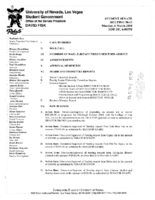Search the Special Collections and Archives Portal
Search Results

Meeting minutes for Consolidated Student Senate, University of Nevada, Las Vegas, March 06, 2000
Date
2000-03-06
Archival Collection
Description
Includes meeting minutes and agenda.
Text

Meeting minutes for Consolidated Student Senate University of Nevada, Las Vegas, May 14, 1999
Date
1999-05-14
Archival Collection
Description
Includes meeting agenda and minutes, along with additional information about workshops. CSUN Session 29 Meeting Minutes and Agendas.
Text

Interview with John Chapman Hopkins, April 11, 2005
Date
2005-04-11
Archival Collection
Description
Narrator affiliation: Physicist, Los Alamos National Laboratory; Test Director; J-Division Leader; Associate Director
Text

Interview with Robert Elmer Friedrichs, August 27, 2004
Date
2004-08-27
Archival Collection
Description
Narrator affiliation: Radiation Safety, Reynolds Electrical and Engineering Company (REECo); Sr. Scientific Adviser, National Nuclear Security Administration (NNSA)
Text

Interview with Raymond Chester Harbert, October 20, 2005
Date
2005-10-20
Archival Collection
Description
Narrator affiliation: Resident Engineer, Holmes and Narver; Program Manager, Plowshare
Text

Interview with Benjamin Clinton Diven, March 10, 2004
Date
2004-03-10
Archival Collection
Description
Narrator affiliation: Physicist, Los Alamos National Laboratory; Manhattan Project
Text

Interview with Philip Lyle Ulmer, January 11, 2005
Date
2005-01-11
Archival Collection
Description
Narrator affiliation: Manager, Protective Force, Wackenhut Services, Inc.
Text

Interview with Herbert Frank York, July 22, 2004
Date
2004-07-22
Archival Collection
Description
Narrator affiliation: Physicist, First director, Lawrence Livermore Laboratory; Arms control negotiator; Director, Defense Dept. Research adn Engineering
Text

Interview with Paul Colbert, July 12, 2004
Date
2004-07-12
Archival Collection
Description
Narrator affiliation: Program Director, Nevada Desert Experience
Text

Interview with Peter Ediger, June 24, 2005
Date
2005-06-24
Archival Collection
Description
Narrator affiliation: Administrator, Pace e Bene Franciscan Nonviolence Center
Text
Pagination
Refine my results
Content Type
Creator or Contributor
Subject
Archival Collection
Digital Project
Resource Type
Year
Material Type
Place
Language
Records Classification
